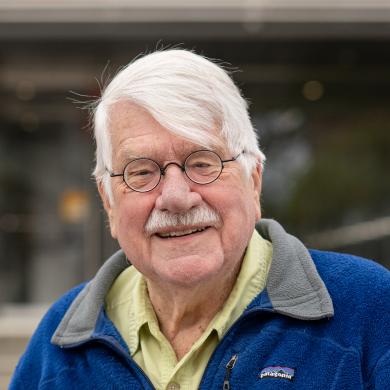
The Work Goes On
Orley Ashenfelter on the “irresistible” pull of policy evaluation & why the IR Section is so special
For the 30th episode of The Work Goes On, we flipped the script and asked our long-time host Orley Ashenfelter, the Joseph Douglas Green 1895 Professor of Economics, Emeritus at Princeton University and former director of Princeton’s Industrial Relations Section (IR Section), to start answering questions instead of asking them. Janet Currie, the Henry Putnam Professor of Economics and Public Affairs at Princeton and one of Orley’s former students, joins us in this episode as a special guest host.
In this episode, Ashenfelter and Currie discuss:
- Ashenfelter’s upbringing and college experience in Southern California (after a brief stint in his mother’s home state of North Dakota) and what brought him to graduate school at Princeton.
- The people who had the biggest impact on Ashenfelter as a student–including Al Rees and Dick Quandt at Princeton–and how the environment of the Industrial Relations Section helped him become a successful advisor himself in later years.
- Ashenfelter’s early work on racial discrimination and labor markets. “I was interested in it from the very start, and interested in how it could happen, how it could exist, and especially how to measure it.”
- Ashenfelter’s service in the U.S. Department of Labor as the Director of the Office of Evaluation and how that experience influenced his research for decades to come. “And what really attracted me was that they dangled something in front of my head, not just this bureaucratic job, which of course seemed like a useful thing to do…they dangled in my face, basically, that I could have access to these data and try to figure out what the effects of training programs were. It was irresistible, just irresistible.”
- Ashenfelter’s famed role in developing new methods of causal inference through natural experiments and the “difference in differences” methodology. “A lot of that came from the Labor Department, too. There was this emphasis on credibility. You needed that in order to convince people that the work that you had done should actually influence policy.”
- Ashenfelter’s views on the appropriate role of theory in labor economics.
- Ashenfelter’s role as the director of the Industrial Relations Section at Princeton, a position he held for nearly 30 years, and why he thinks the Section has produced so many influential economists and thinkers.
Orley Ashenfelter earned his Ph.D. at Princeton University in 1970. He joined the faculty at Princeton soon after and served, at different points throughout his tenure, as director of the university’s Industrial Relations Section. Ashenfelter has also served as director of the Office of Evaluation of the U.S. Department of Labor, as editor of the American Economic Review, and as president of the American Association of Wine Economists. He is a recipient of the IZA Prize in Labor Economics, the Mincer Award for Lifetime Achievement of the Society of Labor Economists, and the Karel Englis Medal awarded by the Academy of Sciences of the Czech Republic. "The Work Goes On"—a podcast produced as Princeton's Industrial Relations Section (IR Section) celebrates its 100th anniversary—is an oral history of industrial relations and labor economics hosted (typically) by Princeton's Orley Ashenfelter.
Ashenfelter, Orley, and Kathryn Jo Graddy. Sale Rates and Price Movements In Art Auctions. Princeton, NJ: Center for Economic Policy Studies, Princeton University, 2011.
Ashenfelter, Orley, Kirk Bennett Doran, and Bruce Schaller. A Shred of Credible Evidence On the Long Run Elasticity of Labor Supply. Princeton, NJ: Center for Economic Policy Studies, Princeton University, 2010.
Ashenfelter, Orley, Stephen Ciccarella, and Howard J Shatz. French Wine and the U.S. Boycott of 2003: Does Politics Really Affect Commerce?. Princeton: Center for Economic Policy Studies, Princeton University, 2007.
Ashenfelter, Orley, Phillip B Levine, and David J Zimmerman. Statistics and Econometrics: Methods and Applications. New York: J. Wiley, 2003.
